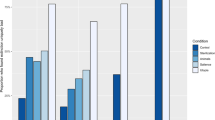Abstract
IT is desirable in a discussion on the Plumage Bill to ensure that knowledge is not controlled by sentiment, and that the solid facts of the matter are borne definitely in mind. Supporters of the Bill give three main reasons for it. They claim that the Bill will stop (1) the extinction of rare birds; (2) cruelty in that it will stop the killing of breeding birds, and so preserve their young; and (3) cruelty in the actual slaughter of birds at all. Against the Bill are the statements that it effects nothing in regard to these points (in that it has no action in the places where the birds occur); that it stops a great deal of perfectly harmless and legitimate trade; and that the real protection of birds must be an international matter, which was being quite easily brought about by voluntary effort, which effort will be killed by the Bill.
This is a preview of subscription content, access via your institution
Access options
Subscribe to this journal
Receive 51 print issues and online access
$199.00 per year
only $3.90 per issue
Buy this article
- Purchase on Springer Link
- Instant access to full article PDF
Prices may be subject to local taxes which are calculated during checkout
Similar content being viewed by others
Rights and permissions
About this article
Cite this article
LEFROY, H. [Letters to Editor]. Nature 105, 168–169 (1920). https://doi.org/10.1038/105168b0
Published:
Issue Date:
DOI: https://doi.org/10.1038/105168b0
Comments
By submitting a comment you agree to abide by our Terms and Community Guidelines. If you find something abusive or that does not comply with our terms or guidelines please flag it as inappropriate.


